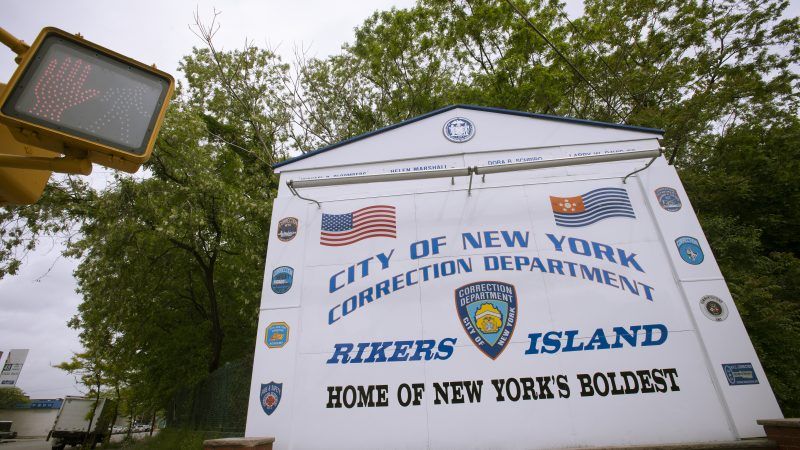New York City Council Votes To Build Four New Jails and To Close Notorious Rikers Island
But can the city commit to reducing its jail population—and will Rikers' infamous culture just be transplanted to the new jails?

After years of pressure from criminal justice reformers and civil liberties groups, New York City is tentatively moving ahead with a plan to shutter its notorious Rikers Island jail complex—the second-largest jail complex in the U.S.—within the next decade.
The New York City Council voted Thursday to approve an $8.7 billion plan that will require building four new jails to replace the Rikers Island complex, which since it began holding inmates in the 1930s has been a high-profile magnet for abuse, violence, corruption, and death.
"This is about valuing our people, no longer condemning people and sending them on a pathway that only made their lives worse and worse," said New York City Mayor Bill de Blasio following the vote. "Today we made history: The era of mass incarceration is over."
Of course, it's much easier to declare mass incarceration over than to actually decarcerate. The tentative plan is to close down the 10,000-bed jail complex on Rikers by 2026. The four new jails together will hold an estimated 3,300 inmates at any given time, meaning New York City will have to find a way to draw down its daily jail population, which currently hovers around 7,000, by more than half.
There will also undoubtedly be political opposition and legal challenges from neighborhoods where the new jails are slated to be built, as well as opposition from conservatives and powerful law enforcement groups in the city.
"There is simply no way to cut the average daily jail population—which the city itself has described as 'more violent and difficult to manage'—that much more without leaving dangerous criminals on the street, where you can be sure they will continue to diminish the quality of life in their neighborhoods," argued Rafael A. Mangual, a fellow at the conservative Manhattan Institute, in the New York Post.
That said, reforms to New York's cash bail system, expanded diversion programs, and other measures are expected to lower the city's jail population.
In any case, the vote to shut down Rikers is a historic development. During the peak of mass incarceration in New York City the 1990s, Rikers held nearly 23,000 inmates.
New York Civil Liberties Union executive director Donna Lieberman said in a press release that the council's vote "marks the start of the long-overdue process to close Rikers Island and put an end to the culture of official lawlessness and abuse which it represents."
"Too many New Yorkers have died or suffered enormous and irreversible physical and psychological harm as a result of their mistreatment at Rikers—Kalief Browder, Layleen Polanco, and far too many others," Lieberman continued.
Browder was 16 years old when he was incarcerated at Rikers for three years without trial—two of them spent in solitary confinement—for allegedly stealing a backpack. After his eventual release, he committed suicide in 2015. Layleen Polanco, a 27-year-old transgender woman, died in a solitary cell earlier this year.
Browder and Polanco's deaths increased the political momentum behind the push to close Rikers. It also galvanized activists who oppose the construction of any new jails at all, who say a hefty $8 billion price tag could be invested in communities rather than new cells.
Activists with No New Jails NYC briefly disrupted the New York City Council meeting, dropping leaflets that read: "If you cage our future, blood on your hands."
"The idea that a new jail can fix the problems of the old one is a long-standing misconception that has driven the carceral expansion of New York City," Shanahan, a criminal justice professor at Governors State University in Illinois, told The Washington Post.
When it opened, Rikers was billed as humane and modern jail to replace the sort of facilities that sounded like, well, what Rikers sounds like today. As I detailed in a 2016 Reason feature on the long, troubled history of the D.C. jail, new buildings can't fix deeper problems in correctional systems.
"When Rikers eventually shutters and the last person leaves the island," Lieberman said, "the abhorrent culture that has always plagued the facility must not follow it."
Again, easier said than done. On Friday, The City reported that de Blasio did not renew the appointment of a New York City Department of Corrections commissioner who has been working for three years to limit the use of solitary confinement in New York City jails.


Show Comments (17)